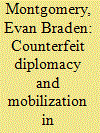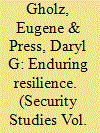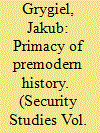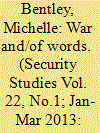|
|
|
Sort Order |
|
|
|
Items / Page
|
|
|
|
|
|
|
| Srl | Item |
| 1 |
ID:
120171


|
|
|
|
|
| Publication |
2013.
|
| Summary/Abstract |
How do policymakers in democratic nations mobilize support for hard-line strategies? Existing answers to this question emphasize the exaggeration of external threats. Yet this overlooks an important dilemma: because democratic citizens expect their leaders to explore peaceful solutions or less aggressive alternatives when foreign dangers are ambiguous, the same conditions that make threat inflation necessary also make it difficult to employ successfully. To mobilize support for hard-line measures when the public wants its leaders to demonstrate restraint, policymakers may therefore attempt to shift blame onto an adversary by using "counterfeit diplomacy." Specifically, democratic leaders may adopt more cooperative or less coercive options than they believe are necessary, but which they anticipate will fail. This approach can be a risky one, however, because an opponent might accept a nation's demands, accede to its conditions, or offer counterproposals in the hope of diffusing support for more confrontational measures.
|
|
|
|
|
|
|
|
|
|
|
|
|
|
|
|
| 2 |
ID:
120175


|
|
|
|
|
| Publication |
2013.
|
| Summary/Abstract |
Plentiful spare capacity persists in the oil production and tanker industries, contrary to Michael Levi's contention in his response to our earlier article, "Protecting 'The Prize.' " OPEC leaders retain excess capacity to minimize cartel members' cheating, and tanker companies retain considerable flexibility that allows them to adapt to political-military and other fluctuations in the market. Oil supplies are not on a knife-edge; exaggerated claims of energy vulnerability distort U.S. national security policy.
|
|
|
|
|
|
|
|
|
|
|
|
|
|
|
|
| 3 |
ID:
120174


|
|
|
|
|
| Publication |
2013.
|
| Summary/Abstract |
In "Protecting 'The Prize': Oil and the U.S. National Interest," Eugene Gholz and Daryl G. Press present an important counterargument to many common but overwrought worries about energy security. Yet they themselves go too far in the opposite direction. Gholz and Press argue that only three types of potential oil market disruptions could induce "particularly painful" adjustments and hence rise to the highest level: consolidation of a large fraction of Persian Gulf reserves under a single power, domestic instability in Saudi Arabia, and blockage of the Strait of Hormuz. I argue in this response that Gholz and Press confine the second and third scenarios too narrowly, and hence understate the security risks stemming from U.S. dependence on oil.
|
|
|
|
|
|
|
|
|
|
|
|
|
|
|
|
| 4 |
ID:
120170


|
|
|
|
|
| Publication |
2013.
|
| Summary/Abstract |
The study of premodern history would greatly improve our understanding of current and future strategic challenges. Premodern international relations, in fact, have certain characteristics that are reappearing in our times. I underline three such features: the presence of non-state actors, the pursuit of nonmaterial objectives, and the difficulty of diplomacy and deterrence. As a result, international relations were often characterized by conflicts "below the military horizon," timeless violent confrontations rather than wars. The paper concludes with an analysis of current trends that are bringing back some of these premodern traits and suggests several hypotheses for further research.
|
|
|
|
|
|
|
|
|
|
|
|
|
|
|
|
| 5 |
ID:
120173


|
|
|
|
|
| Publication |
2013.
|
| Summary/Abstract |
What explains change and continuity in the foreign policy behavior of small states? Given the proliferation of small states over the past century, this topic has received relatively little systematic attention. When researchers do focus on small states, the emphasis has been on external and international factors, and the primary conclusion has been that small states are more likely to bandwagon with threatening great powers than to balance against them. In this article, we suggest that state- and individual-level variables can play a greater role in explaining the foreign policy behavior of small states and that small states sometimes choose to balance rather than bandwagon, especially when elite ideology is deeply embedded in formulating foreign policy. We develop this claim in terms of elite ideas about the identity and purpose of the state and examine its plausibility using primary sources and exclusive interviews with the security and foreign policy elite in Georgia. We find that this approach offers a more plausible explanation for Georgia's otherwise puzzling foreign policy behavior than frameworks that focus on the international or regional system. Although Georgia may be the exception that proves the rule, it can advance an understanding of the conditions under which standard explanations of small-state foreign policy behavior may miss their predictive mark and when incorporating the role of elite ideas can provide additional explanatory leverage.
|
|
|
|
|
|
|
|
|
|
|
|
|
|
|
|
| 6 |
ID:
120172


|
|
|
|
|
| Publication |
2013.
|
| Summary/Abstract |
This article provides an examination of the use of concepts- specifically "weapons of mass destruction" (WMD)-in security discourse. There are two key aspects to this discussion. First, the paper disputes current perceptions of WMD conceptual meaning. By analyzing the origins of the concept within the context of US foreign policy c.1945-48, it will be shown that, far from the fixed concept this has been assumed to be, WMD has been defined in a wide variety of ways. Second, this paper will demonstrate that these shifts in conceptual meaning are the strategic and intentional product of security actors. In the case of the concept's emergence, US policymakers exploited the concept as a political resource where its selective definition created an opportunity to manipulate and shape the post-Hiroshima arms-control regime. This article will discuss this in relation to the work of Quentin Skinner-in particular, his conception of the "innovating ideologist."
|
|
|
|
|
|
|
|
|
|
|
|
|
|
|
|
|
|
|
|
|